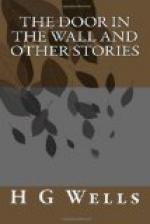“Quite,” said Raut, and stood up also.
There was another pause. Each of them peered through the indistinctness of the dusk at the other two. Horrocks’ hand still rested on Raut’s shoulder. Raut half fancied still that the incident was trivial after all. But Mrs. Horrocks knew her husband better, knew that grim quiet in his voice, and the confusion in her mind took a vague shape of physical evil. “Very well”, said Horrocks, and, dropping his hand, turned towards the door.
“My hat?” Raut looked round in the half-light.
“That’s my work-basket,” said Mrs. Horrocks, with a gust of hysterical laughter. Their hands came together on the back of the chair. “Here it is!” he said. She had an impulse to warn him in an undertone, but she could not frame a word. “Don’t go!” and “Beware of him!” struggled in her mind, and the swift moment passed.
“Got it?” said Horrocks, standing with the door half open.
Raut stepped towards him. “Better say good-bye to Mrs. Horrocks,” said the ironmaster, even more grimly quiet in his tone than before.
Raut started and turned. “Good-evening, Mrs. Horrocks,” he said, and their hands touched.
Horrocks held the door open with a ceremonial politeness unusual in him towards men. Raut went out, and then, after a wordless look at her, her husband followed. She stood motionless while Raut’s light footfall and her husband’s heavy tread, like bass and treble, passed down the passage together. The front door slammed heavily. She went to the window, moving slowly, and stood watching—leaning forward. The two men appeared for a moment at the gateway in the road, passed under the street lamp, and were hidden by the black masses of the shrubbery. The lamp-light fell for a moment on their faces, showing only unmeaning pale patches, telling nothing of what she still feared, and doubted, and craved vainly to know. Then she sank down into a crouching attitude in the big arm-chair, her eyes wide open and staring out at the red lights from the furnaces that flickered in the sky. An hour after she was still there, her attitude scarcely changed.
The oppressive stillness of the evening weighed heavily upon Raut. They went side by side down the road in silence, and in silence turned into the cinder-made by-way that presently opened out the prospect of the valley.
A blue haze, half dust, half mist, touched the long valley with mystery. Beyond were Hanley and Etruria, grey and dark masses, outlined thinly by the rare golden dots of the street lamps, and here and there a gaslit window, or the yellow glare of some late-working factory or crowded public-house. Out of the masses, clear and slender against the evening sky, rose a multitude of tall chimneys, many of them reeking, a few smokeless during a season of “play.” Here and there a pallid patch and ghostly stunted beehive shapes showed the position




